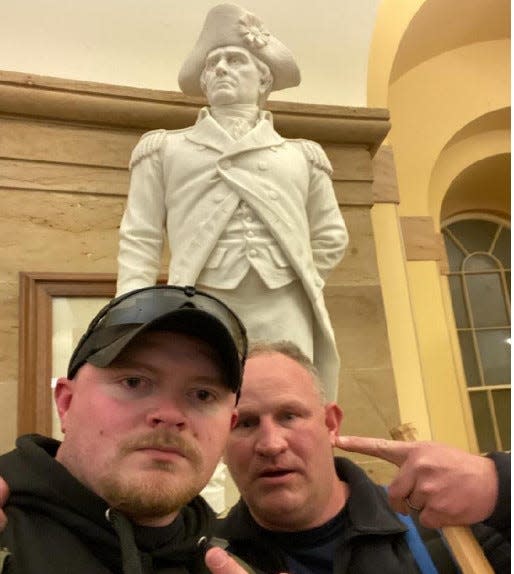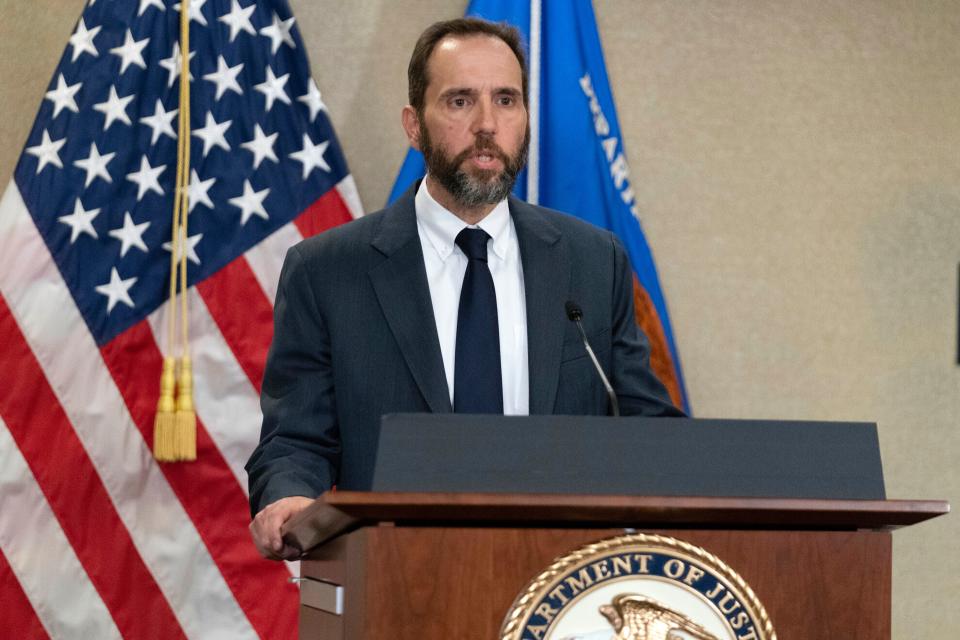A Jan. 6 conviction was upheld on appeal. Why this particular ruling could affect Trump's case.
- Oops!Something went wrong.Please try again later.
WASHINGTON – When a divided federal appeals court upheld the conviction and 87-month sentence of a Capitol rioter, the judges did more than crush the hopes of a single insurrectionist -- they also spelled trouble for embattled former president Donald Trump's fight over the same issue.
Trump's peril in his federal election conspiracy case hangs on the definition of a single word: "Corruptly."
Thomas Robertson, an Army veteran who was a Virginia police sergeant at the time of the riot, appealed his conviction for obstructing Congress by arguing he hadn't acted "corruptly." His lawyers argued that meant "for the unlawful advantage of himself or an associate."
Trump has also argued he couldn't have violated the statute because he was voicing his concerns about election fraud, as allowed under the First Amendment.
In Robertson's case, two of the three judges on the panel of the D.C. Circuit Court of Appeals ruled his proposed definition "finds no support in the text, structure, or context of the statute." The majority upheld the definition applied in jury instructions that acting corruptly meant using "unlawful means" or "with an unlawful purpose" and "consciousness of wrongdoing."
"The evidence presented at Robertson’s trial was undoubtedly sufficient to prove that he acted 'corruptly,'" Judge Florence Pan wrote Friday for Judge Cornelia Pillard.
Appeals Judge Karen Henderson disagreed, arguing the decision "makes the commission of any crime 'corrupt' because any crime requires the use of unlawful means or an unlawful purpose or both."
"There is no evidence in the record suggesting Robertson obstructed the election certification proceeding in order to obtain an unlawful benefit for himself or someone else," Henderson wrote.

Trump also fights federal charge he acted 'corruptly'
Robertson could potentially appeal the decision to the Supreme Court. The decision carries implications for Trump because he has also challenged the definition of acting "corruptly."
"That opinion confirms that the indictment here is deficient in failing to properly allege that President Trump acted 'corruptly,'" Trump's lawyers argued Monday in a filing to U.S. District Judge Tanya Chutkan. The government has not yet replied to his argument.
Several people charged in the Capitol attack have challenged the Justice Department’s interpretation of the obstruction statute. Robertson was convicted of six charges, including one for "corruptly" obstructing Congress from certifying Electoral College votes and another for obstruction for destroying cell phones. He was convicted at trial in August 2022, and sentenced to 87 months in prison.
The statute calls for fines or imprisonment for "whoever corruptly" either "obstructs, influences, or impedes any official proceeding" or "alters, destroys, mutilates, or conceals a record, document, or other object, or attempts to do so, with the intent to impair the object's integrity or availability for use in an official proceeding."
Robertson's lawyer, Timothy Cone, took issue with "corruptly," which he defined as meaning “the intent to obtain an improper advantage for oneself or someone else.”
"Roberston was not out to benefit himself," Cone argued. "Any hope of benefit for President Trump was too remote from Robertson’s conduct to make this conduct criminally corrupt."

Appeals panels have so far upheld DOJ's interpretation of statute
A separate appeals panel ruled in April the obstruction provision could cover a “wide range of conduct” that corruptly targeted Congress counting Electoral College votes.
The case involved three men charged in the riot with assaulting police and other charges. The District Court dismissed obstruction charges by ruling the men hadn't committed obstructive acts related to “a document, record, or other object" to obstruct Congress.
But the appeals panel reversed the lower court's ruling.
"In our view, the meaning of the statute is unambiguous," the panel ruled. "Thus, the broad interpretation of the statute − encompassing all forms of obstructive acts − is unambiguous and natural, as confirmed by the 'ordinary, contemporary, common meaning' of the provision’s text and structure.
Plenty of evidence for jury to find Robertson acted 'corruptly': appeals panel
In Robertson's case, the appeals panel noted he and another rioter followed a group Jan. 6 that broke through scaffolding on the west side of the Capitol, crossed barricades and passed numerous police officers trying to keep rioters out.
Robertson entered the building about 2:16 p.m. a few minutes after the first breach, according to the decision. Broken glass was on the floor and an alarm blared. Robertson banged a stick he was carrying on the floor in time with a chant of "Who's House? Our House," according to the decision.
Robertson and another rioter took pictures of themselves and the chaos. Robertson was part of the mob that forced members of Congress to flee for six hours. After January 6, Robertson celebrated his participation in the riot on social media.
"Enjoy your feel good protests and fame," Robertson said in one post on social media. "I’ll simply accept a ‘Thank you’ for the very blanket of freedom that you live and sleep under.”
"On review of the sufficiency of the evidence, we need only determine that the 'corruptly' element was satisfied by the evidence presented in Robertson’s trial," Pan wrote. "We hold that the jury could have found, consistent with the district court’s instructions, that Robertson acted 'corruptly' based on evidence that he used felonious 'unlawful means' to obstruct, impede, or influence the Electoral College vote certification."
This article originally appeared on USA TODAY: Why one man's Jan. 6 appeal being denied could spell trouble for Trump

